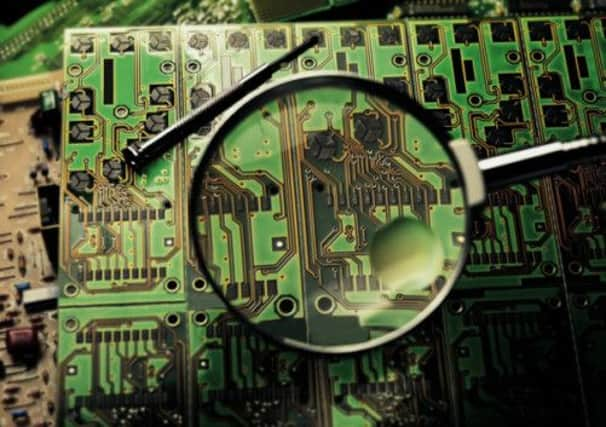Profits up 30pc at UK chip firm behind iPhone


The Cambridge-based company reported a 30 per cent rise in pre-tax profit to £86.6m ($133m), beating forecasts.
ARM has outperformed the wider semiconductor market for the past five years, helped by the use of its processors in smartphones like Apple’s iPhone and tablet computers.
Advertisement
Hide AdAdvertisement
Hide AdIt licenses its designs and receives a royalty on every chip shipped by its partners.
Yorkshire-based staff from ARM are helping to create microchips for the consumer devices of the future and the 65-strong team at the company’s Sheffield office are also helping ARM to move into the server market, which places it in direct competition with big industry names like Intel.
Chief Executive Simon Segars, who took over from Warren East on July 1, said the firm was continuing to see strong demand for its latest technology for both application processors – the “brains” in mobile devices – and for graphics technology.
Processor design licensing revenue rose 34 per cent year-on-year to £56.9m, comfortably beating market expectations. Analysts at Liberum expected 18.7 per cent growth.
Advertisement
Hide AdAdvertisement
Hide AdFinance Director Tim Score said he did not see any slowdown in licensing and highlighted a 10 per cent increase in the order backlog.
“The underpin for future licence revenue is looking very strong,” he said.
Shares in ARM reached a high of £11.11 in May, exceeding the level they were trading at in the dotcom boom of 2000.
They have since dropped, but they rose again yesterday.
Analysts at Investec, who rate the shares a “buy”, said the highlight of the results was the exceptional licence number, which it said was due to very strong new signings, rather than orders taken from the backlog.
Advertisement
Hide AdAdvertisement
Hide AdARM’s partners signed 25 licences for its technology in the quarter, including five for its latest Cortex-A designs and seven for its Mali graphics technology.
The company has been increasing its share of the graphics processing market.
On Tuesday, Samsung said it had selected Mali for its latest high-end processor, ousting rival Imagination Technologies.
There have been some signs of softness at the top end of the smartphone market, marked by weaker-than-expected sales of Samsung’s flagship Galaxy S4.
Advertisement
Hide AdAdvertisement
Hide AdApple, however, comfortably beat forecasts for iPhone sales on Tuesday.
Mr Score said he expects the smartphone market to remain strong, although the 50 per cent-plus growth rates of recent years were easing.
ARM does not rely on the top end of the market, he said.
“All smartphones contain more ARM technology than less sophisticated phones and therefore generate higher royalties,’’ he added.
Royalties from chips shipped by partners, such as Qualcomm and Texas Instruments, reported a quarter in arrears, rose 26 percent year-on-year to £77.7m, broadly in line with expectations.
Advertisement
Hide AdAdvertisement
Hide AdARM reiterated its guidance for full-year revenue to at least meet market expectations.
Mr Score said he expects analysts revenue forecasts to rise after the second-quarter results, to about $1.09bn for the year.
Analysts expected the company to report pre-tax profit of £82.5m on revenue of £165m for the quarter, according to a company-supplied consensus.
ARM hopes its performance will be boosted by a new processor it unveiled earlier this year at a major trade show.
Advertisement
Hide AdAdvertisement
Hide AdARM introduced the new Cortex A-12 processor, which has been devised for smartphones that sell for between £131 and £229; a market that the company said would accommodate half a billion devices a year by 2015.
ARM also expects to see its chip designs appear in a new generation of wearable devices in the future, such as smart watches, which it said could be available this year. Apple has reportedly recruited staff to work on an iWatch device which could create a major new market.
“Wearable and interneted devices are starting to come into the industry, ” ARM marketing executive vice president Ian Drew said last month.
“I was riding a bike with a motion detector, and we’ve demonstrated a fork that has ARM control in it to count calorie consumption... I suspect sometime this year you’ll see one or two (manufacturers) demonstrate smart watches.”
Advertisement
Hide AdAdvertisement
Hide AdUS rival Intel, the world’s largest chip maker, has struggled to respond but has recently unveiled new mobile processors.
Devices that sell in the billions
Former chief executive Warren East is credited with transforming ARM Holdings, which has a base in Sheffield, into one of the biggest players in its sector.
The company’s technologies were used by semiconductor customers in nearly nine billion chips last year.
When Mr East became chief executive in 2001, ARM had just one processor product line. He retired this month and was replaced by Simon Segars, who joined the ARM board in 2005. It’s estimated that during Mr East’s tenure, ARM received royalties for more than 40 billion chips.
The company employs around 1,000 people in the UK. It provides technology for nearly all mobile phones and many other electronic devices.